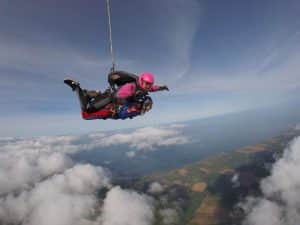Jumping from an aeroplane above an astonished crowd helped Wendy Mitchell prove that people with dementia, like her, do not need to be stuck indoors.

I’m sitting in front of my GP with a piece of paper on which I need her signature. “I need your permission for something,” I say. She looks back, puzzled. I push the paper across the desk to her, and as she opens it, I see her forehead crease with confusion.
“You’re going to do a skydive?” she says finally.
When Young Dementia UK, a charity I’m involved with, said they wanted to raise funds by organising skydives, they probably expected relatives or carers to take part. But I was fit and well, and who says people with dementia can’t jump out of planes?
I wonder whether my GP will approve the medical waiver. Luckily for me, she read my first book – about life after being told that I
had early-onset Alzheimer’s in 2014, when I was 58 – which changed her view about dementia. And so, with a smile curling at her lips, she signs.
I remember the last time I went to the airfield, for a flight in a glider. The pilot asked my daughters if I was up to it. I tried not to take offence, knowing such an attitude of disbelief was why I needed to write What I Wish People Knew About Dementia.
Whenever I have spoken to people about this latest madcap plan, there has always been disbelief in their eyes. I remind them that I will be strapped to someone else – with no fear I will forget to open my parachute. “I can just relax and enjoy myself,” I say. I’m not sure they’re convinced.
I wonder why there is so much risk aversion. My quality of life is as important as the next person’s, and I want mine to be filled with experience and adventure. Why wouldn’t I?
Both my daughters always provide constant encouragement, despite their initial shock at whatever it is I want to do next. They have let go of worry in the same way I have. They just allow me to enjoy life, and for that I’m forever grateful.
At the airfield I’m introduced to my fellow skydivers. No one mentions dementia, not even as we sit with a cuppa watching all the other parachutes descend from the clouds.
Our training is, of course, utterly hilarious for me. There are long lists of “musts” and “must nots”. I capture one: you must lift your feet when landing.
I make jokes to put the others at ease – particularly the woman who was “surprised” by her family that morning with a skydive for her 50th birthday.
The two guys who will be filming us make polite conversation. I mention then that I have dementia. They take it in, but don’t bat an eyelid. These are people of the same mindset as me, craving adventure. They won’t consider me a liability.
My jumpsuit is placed in front of me. I stare down, not knowing which arm or leg to put where. A giant of a man, all dressed in pink, strides towards me.
“Let me help you get into this contraption,” he says calmly. “We’re going to make this a day to remember.” I don’t like to say anything to him. I have no fear, just complete confidence that Mr Pink Man will see me safely back down to earth.
When I prepare to walk over to the plane, onlookers gather around my daughter Gemma, their eyes darting to and from me, as if saying: “Should she be doing this?” I give her one last hug and tell her: “I’m so excited!” The jumpsuit I’m wearing is so cumbersome that I waddle towards the plane. Two men hoist me in. I’m surprised to see the inside has no seats, just the floor to sit on.
When we start our ascent, the plane’s engines roar. I watch the stunning views over the coastline as Mr Pink Man gives me a running commentary of what we can see – Scarborough, Robin Hood’s Bay, my beloved Humber Bridge. The ascent to 10,000ft takes around 20 minutes and a beep signals it’s time to leap. Mr Pink Man fastens us tight together and we shuffle towards the open door.
“Head back, head back,” he repeats in my ear as the rush of cold air hits me, stealing my breath away. And then we jump.
I am floating, the earth below me, Mr Pink Man strapped to my back like a turtle shell. We are higher than the birds. We are freefalling down to earth at 130mph and I am smiling wider than I have ever smiled before. If this is not freedom, then I don’t know what is. Up here, there is no dementia. Up here, that disease does not inhabit my brain. I am flying, free from all that binds me to the Earth.
The jolt of the pink parachute takes me by surprise, and as it opens above us, so too does the peace, the silence, a sense of stillness as we float gently down. The clouds are our company, the ground a finished jigsaw.
A voice in my ear says: “Do you fancy doing some acrobats and twirls?” I hear myself replying: ‘Yes!”
We whoosh through the air, spinning this way and that. I close my eyes at first, a sensation that my eyeballs might just vacate their sockets, but once I’ve adjusted, I peer out again and squeal with delight as the world whizzes by.
We right ourselves again. Up here it feels as if we’re descending so slowly, yet as the ground comes closer – and I spot Gemma waving, a tiny dot – I see we are actually travelling at an alarming rate.
“Legs up,” Mr Pink Man shouts as we come closer every second to the viewing area. I’m confused because I thought the landing spot was behind the woods. I feel the smile still plastered to my face, as if the wind has left it there, but there is no energy left in me from the thrill.
I hear people shouting. “Legs up, Wendy!” Mr Pink Man must realise this and he lands us both like ducks on water, and I collapse in a heap at his feet. “Did we miss the landing spot because of me?” I ask.
“No,” he says. “We had to show everyone you could do it.”
He hugs me and undoes all the clips and fasteners. Two other men help me stagger back to the hangar to the sound of claps and cheers, and there I take off my jumpsuit. I wrap Gemma in a huge hug and then a man from the crowd interrupts us. He takes a £20 note out of his wallet because he knows I’m doing this for charity. “Amazing, well done,” he says, handing it to me.
Had he been one of the doubters as I took to the air? Who knows? In that moment I hardly care. If I listened to what everyone else says, I would never have jumped out of an aeroplane. I would never have done half the things that others say are not possible for people living with dementia. For now, back on terra firma, I’m still buzzing – and plotting my next adventure. Why on earth should they ever stop?
(Article source: Inews)

